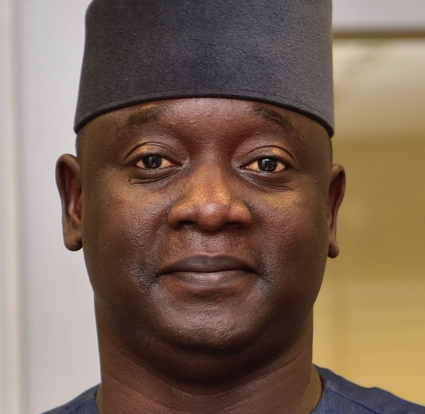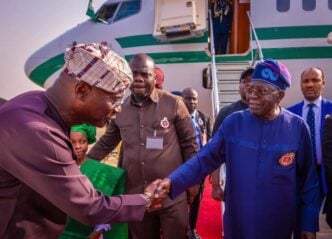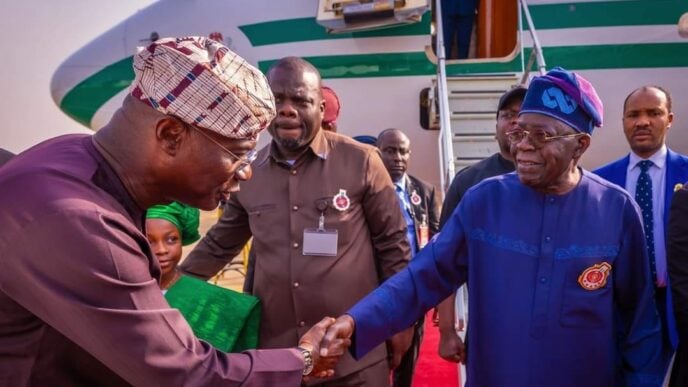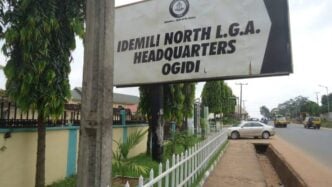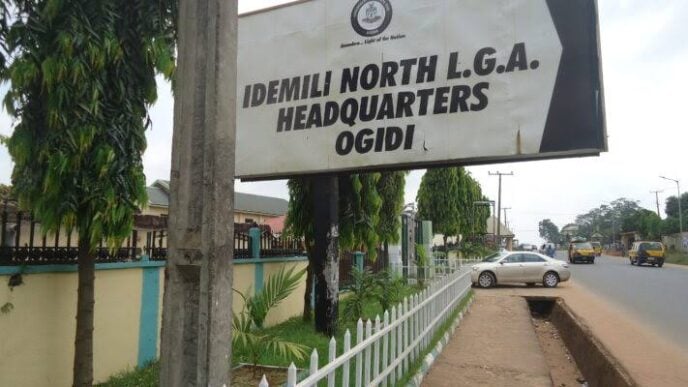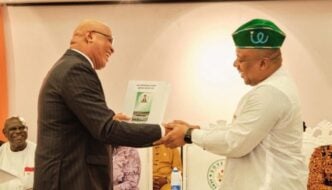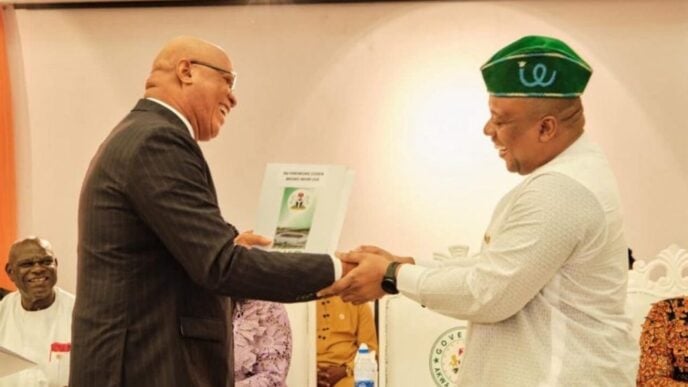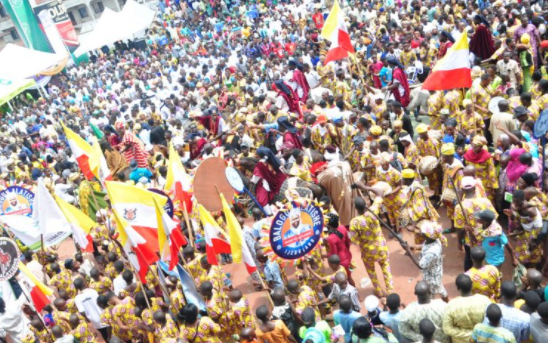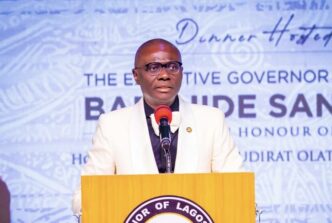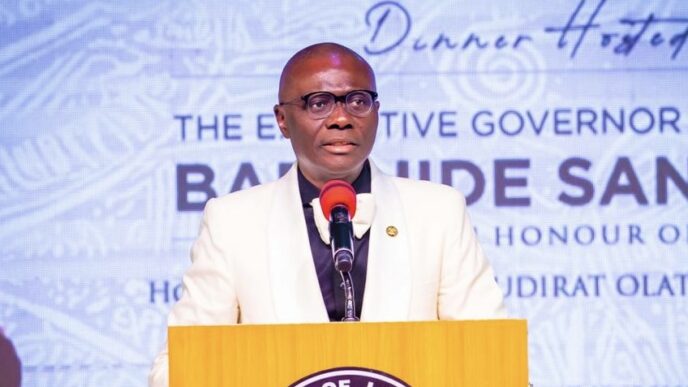The book, ‘Professionalism and Service to Fatherland: The Military Heroes of Southern Kaduna’, authored by Agat Chocho Nkut, will be presented to the public in Kagoro on 7th June 2025, a third hub of Christian Missions in Southern Kaduna general area after the opening of the Kwoi mission field by Rev F.E. Hein in July 1910, Kurmin Musa in 1921 by Rev. T. Allen, and then Kagoro in 1927 by Rev. Thomas Archibald. As such the choice of Kagoro is significant because it birthed a struggle for the freedom and consciousness of the indigenous peoples of Southern Kaduna general area.
Kagoro is where the famous Malam Gwamna Awan reigned after studying in Toro Teachers College and returning as a teacher and as an assistant scribe, and later as scribe. He succeeded his uncle, His Royal Highness Biya Kaka, as the 5th Chief of Kagoro on 11th April 1945 as announced by G. D. Pitcairn, the British colonial Resident of Zaria Province, after a long period of subtle scheming and maneuvering. It took almost a year before Awan succeeded Biya who died in August 1944. In all, Awan reigned for 63 glorious years, leading with sterling qualities, and above all working for God and community.
Kagoro is the location where the fearless and vocal Sudan Interior Mission (SIM) clergy Reverend Bagaiya Nwaya lived and practiced his vocation, playing notable roles in SIM which later metamorphosed to Evangelical Church of West Africa and is now Evangelical Church Winning All (ECWA). He played a critical role in the formation of the Northern Christian Association (NCA) established on the 10th April 1964, and was deeply involved in the campaign for political liberation of the non-Muslim Groups as coined by historians of the origin of Northern Nigerian Christians. There are two interesting stories linking Rev. Archibald and Rev. Bagaiya Nwaya, according to Yanet Afuwai in his book ‘The Place of Kagoro in the History of Nigeria’, published in 1997. Archibald, who I earlier mentioned in my introduction, Yanet said, had spent a year in Kagoro without a single convert. But in 1928, things changed. According to Yanet, Archibald’s first spiritual breakthrough came on 5th May 1928, during a conversation between Bagaiya Nwaya and his friend, Gyet. Gyet introduced a topic that deeply impacted Bagaiya—God and the Day of Judgment—when unbelievers would face condemnation and believers, eternal life. The next day, May 6th, Bagaiya and Kuliyak Kabonbuok accepted Christianity. Bagaiya and Kuliyak’s conversation marked the beginning of Christian conversion in Kagoro.
In a second account stated by Bagaiya’s family in an oral interview with Afuwai, Bagaiya was the first Christian convert and Kuliyak the second in Kagoro. The second story is, Bagaiya’s birth name was Tyag’anet. However, during interactions with the missionary (who lived near his father), there was a communication gap, as Bagaiya did not speak Hausa. When the missionary asked for his name, Bagaiya remained silent. Needing a name to record, the missionary wrote in Hausa: “Ba Gaiya Sunan shi” (meaning “He won’t say his name”). From that phrase, the name “Bagaiya” was derived—and it remained. Reverend Bagaiya and His Royal Highness Gwamna Awan were quite close and were reported to have been associates of the duo of Sir Ahmadu Bello and Abubakar Tafawa Balewa on issues related to the common good of the peoples of Southern Kaduna and the other non-Muslim Groups.
Advertisement
Still on the efforts of the duo of Gwamna Awan, Reverend Bagaiya and Dawuda Haruna Kwoi in the struggle of their community, Southern Kaduna (then known and addressed as ‘Southern Zaria’) scholars like MG Smith and Billy Dudley, according to Professor Yusufu Turaki in his book ‘The British Colonial Legacy in Northern Nigeria’, showed their disagreement on the origin and strategy of the Northern Nigerian minority under the auspices of Middle Zone League. MG Smith was of the strong belief that the struggle was midwifed on what he referred to as ‘Kagoro Initiative’, while Dudley and others were of the view that it was spearheaded by what they also referred to as ‘Berom Initiative’, Turaki quoted a colonial intelligence report as saying: “It is worth bearing, in mind that Sarkin Kagoro (Gwamna Awan) wields considerable influence in ‘Middle Belt Politics’ and that his influence is not confined to this province (Zaria).”
In a nutshell, the Colonial Administration in Kaduna had always viewed ‘Southern Zaria’ as the origin of Middle Belt politics, as Turaki summed it up. It is worth mentioning that the brains behind the struggle from ‘Southern Zaria’ and Jos axis were the two monarchs, HRHs Gwamna Awan and Rwang Pam, then Reverend Bagaiya, Pastor David Lot, Dawuda Haruna Kwoi, Patrick Dokotri, and Joseph Tarka from the Tiv flank of the struggle. All these developments set up the grounds for the presentation of the plights of the minorities tabled before the Sir Henry Willink Commission constituted on 23rd November 1957. It met between 23rd November 1957 and 12th June 1958. It received memoranda from individuals and minority groups.
To add more flavor and context to the issue in question, Kagoro is the birth place of the General Martin Luther Agwai as narrated by Rebecca Agwai in her book ‘How A Congress Of Baboons Made A General’. According to the author, General Agwai was born on the 8th November 1948, while his father was a student attending a Teachers’ Training College. General Agwai would rise from his birth in Kagoro to become a Second Lieutenant and then to the enviable rank of a Four-Star General serving as Chief of Army Staff and later Chief of Defence Staff. Aside breaking records as the Best Cadet in order of merit and winning a gold medal, he commanded the Passing Out Parade of Regular Course 8 and was awarded the Sword of Honour for being the Best-All Round Cadet on 8th September 1972, as captured in a book Iconic Soldier and Peace Maker: A Biography of Martin Luther Agwai.
Advertisement
There’s much to say about Kagoro but the gathering will only center on the Southern Kaduna indigenous peoples foray into the Armed Forces of Nigeria during colonialism and the post-independence era as explained by Nkut in the book that will be presented. I will not delve into the meat of the book because the book reviewer will do justice to that; my task is to highlight some breakthroughs of some Southern Kaduna natives in what is now known as the Armed Forces of Nigeria and to also appreciate Nkut in this painstaking journey of unearthing forgotten histories and memories and paying tribute to our notable ones. Can Anything Good Come Out Of History? This question is eventually the title of what is said to be the last book authored by the famous historian of blessed memory, Professor Obaro Ikime, and I will come up with the answer to the question as answered by Professor Ikime at the end of this piece. But I digress. On to the issue concerning forays of indigenous peoples of what is now known as Southern Kaduna in the Nigeria’s military.
The Nigerian Army’s origins date back to 1863 when Lieutenant John Hawley Glover formed the “Glover Hausas,” a local force of 18 Northern Nigerian indigenes. Initially, this small force was tasked with protecting British trade routes in Lagos and conducting punitive expeditions in the Lagos hinterland. By 1865, the “Glover Hausas” had become a regular force known as the “Hausa Constabulary,” performing both police and military duties for the Lagos colonial government. This unit later evolved into the “Lagos Constabulary” and eventually became the “Lagos Battalion” after being incorporated into the West Africa Frontier Force (WAFF) in 1901.In addition to the Hausa Constabulary, the British government established other forces in Nigeria, including the Royal Niger Company (RNC) Constabulary in 1886 and the Oil Rivers irregulars in 1891. Lord Frederick Lugard played a significant role in shaping the Nigerian military when he formed the precursor to the WAFF in Jebba, Northern Nigeria, in 1889. This new unit expanded by absorbing elements of the RNC Constabulary and other paramilitary units across British dependencies in West Africa.
The WAFF’s establishment led to the merger of various units into regiments in each dependency. In Nigeria, this resulted in the formation of the Northern Nigerian Regiment and the Southern Nigerian Regiment. These regiments were later used in military expeditions during the annexation of Nigeria by Lord Lugard between 1901 and 1903. The first commanders of the Southern Regiment of WAFF included Lieutenant CHP Carter (1899-1901) and Colonel J Wilcox (1900-1909) as gleaned from the Nigerian Army Archives.
In all my researches, I have not been able to prove or confirm that one or some of the 18 selected Northern Nigerian indigenes chosen by Lieutenant Glover to set up what is today’s Nigerian Army were of ‘Southern Zaria’ extraction but there are some accounts that suggest that some indigenous peoples of the area were taken as slaves to the Europe and beyond, and may have been conscripted into the military elsewhere having lost their identities. There is another account of four slaves found on a European bound vessel as reported by George Hardington of Freetown, consistently stating ‘hye shu Ham’ meaning ‘we are Ham’, synonymous to Ham people of present Southern Kaduna found in Kachia, Jaba and Kagarko local government areas. Similarly, a British Army officer, Major AJN Tremearne who worked in the Zaria Province in his book ‘The Tailed Head-Hunters of Nigeria’ (published in 1912) having served in what is now known as Southern Kaduna, in one of the chapters that dealt with Punitive Patrol, mentioned the military-like prowess of the Southern Zaria and several encounters. The book was mainly an account of his seven-year experience in what he refers to as ‘Northern Nigerian Pagan Belt, and a Description of the Manners, Habits, and Customs of the Native Tribes’. Curiously Major Treamearne spend time in Marsa and had contact with our great-great-grand-parents through an interpreter. Most of the pictures he published of Bajju natives, who he called ‘Kajji of Mersa’, were members of our family, as one of my uncles I showed the pictures identified some whom he met while growing up in the 1940s. Another of my uncles, a quantity surveyor, Thomas Gyang whom I showed the pictures identified some he met as a kid in the late 1950s.
Advertisement
Whatever it is, the people of Southern Kaduna have been part and parcel of Nigerian military evolution since its formal formation from 1863 to the First World War, Second World War, the Peace Keeping Missions in Congo and other parts of the world. Digging the history of Southern Kaduna natives’ foray in the military is a herculean task that cannot be exhausted due to its complicated nature and a lack of sound documentation. Although there is very slim chance to glean and view archival materials on the role of some of our forebears in the First World War, General Agwai had mentioned his uncle Baba Anji who served in the colonial army and fought in the said First World War. The likes of Habu Katung, Baba Kazah, Kura Bodi, Ali Maikasa and others who fought the war in Burma were reported in oral accounts to have done well in their sojourn in the Nigerian military. Painfully, very little is known and documented of their exploits.
In the pre-Independence era, Lieutenant Colonel John Ngan Jeb Sawntong popularly known as JNJ Sawntong, who was born on 16th September 1936 and died on the 17th September 2012, is said to be the first commissioned officer from Southern Kaduna and first in Kaduna State with the split of old Kaduna in 1987, with an Army number that goes thus: N/229, and was an Aldershot Infantry trained officer in the United Kingdom. I also obtained his Second Lieutenant rank picture in the colonial army uniform. There are a few others like Lt.Col Joshua Maigari, who was commissioned on 28th July 1962, the cerebral Colonel Abdulazizi Dauda Somo Wya, popularly known as ADS Way. Wya was a member of Course 3 of the Nigerian Military Training College from where he went to Sandhurst where he got his commission as a Second Lieutenant in 1962. There was also Major General Zamani Lekwot, who was already a boy soldier after passing out in flying colors from the Nigerian Military School and proceeded to India where he got his commission in addition to receiving Gold Medal for being 1st in the order of merit on passing out. Lt. Colonel Maigari is said to have been ADC or worked closely with Brigadier Abba Kyari when he served as the military Governor of North-Central. I am sure Nkut documented Major General Yohanna Yerima Kure, another famous officer in the Nigerian Army who also fought the civil war and was credited with the quelling of the dreaded Maitatsine uprising of 1980. Kure’s father known as Malam Kure Manchaik was a foremost activist, evangelist and SIM teacher. He was linked with the United Middle Belt Congress and local chief of Kurmin Musa. He was imprisoned along Usman Sakwak in the heat of their activism.
There is also an officer I like to talk about known as Lieutenant Sunday Zamani from Jankasa, who was a Batman and later Orderly of Brigadier Zakariya Maimalari throughout Maimalari’s career until January 1966 coup when Maimalari was killed. Maimalari had made Zamani (then a Corporal) his Orderly in Maiduguri where they met, he took him to all the units and formations he served, even as far as Congo during the Peacekeeping Mission. With Maimalari’s penchant for Corporal Zamani and his sheer hard work, Zamani’s courageous outing earned him a field commission to the rank of Lieutenant during the civil war and he dedicated his achievement to late Brigadier Maimalari. The only time Zamani was not with Maimalari was when the Brigadier went to Pakistan on a course and put Zamani under the care of General Aguiyi Ironsi. I have seen Zamani’s pictures with Maimalari’s family in which he was holding children of the Brigadier notably Abubakar Maimalari (who grew up and joined the military and served as Military Administrator of Jigawa State) and his sister Amina.
Zamani died in 2015 while serving as Dagaci in Jankasa but I was told his wife Mama Maryamu is still alive in her nineties. Even when the Nigerian Defence Academy came on stream in 1964, among Course 1, of the four cadets admitted from the then Zaria Province, three were from Southern Kaduna as follows: Boman T. Kachim, Michael Mugu and Baba Sukai. There are others whose exploits in the Nigerian Navy and Air Force I know Nkut captured. The likes of Air Vice Marshalls Ishaya Aboi Shekari, Usman Muazu and John Adamu Mbaka and Group Captain Haruna Zego Aziz. were the pacesetters from this wing, while Rear Admiral Nuhu Kyona Wyom, Vice Admiral Ishaya Iko Ibrahim come to mind who all wrote their names in gold in the Navy and Air Force histories. As fate would have it, the trio of Colonel B.T. Kachim, Group Captain Haruna Zego Aziz, and Adamu Mbaka, all retired, have their sons (Rear Admirals HS Zego and GJ Kachim and Air Vice Marshal GA Mbaka) currently serving and holding strategic positions in the Nigerian Navy and Air Force.
Advertisement
While it was quite an interesting journey, with many Southern Kaduna officers and men shining like stars at home and far away Congo, Burma, Lebanon, Liberia and Sierra Leone, there were moments of grief as well. Aside the exploits, many have paid the supreme price with their lives during operations and wars notably the Nigerian civil war and other critical assignments within and outside the shores of the country. Some were Missing In Action and never found while others were Wounded In Action along with many other hazards that comes with a military career. One of the painful periods was the C-130 plane crash of 26th September 1992 in Lagos which killed all the personnel on board, notably Senior Course15 participants including foreign participants along with their instructors, crew and some civilian staff of the Armed Forces Command and Staff College. Of all the victims, the following officers and one soldier were of Southern Kaduna extraction: Major S. Bature, Major CUM La’ah, Major IE Muazu, Major ID Nok, Major Philip Yaro, Major VS Kure, and Sergeant Michael Bahago. Like a twist of fate, another tragedy of plane crash occurred on 17th September 2006, in Benue state, killing senior military officers including our own Major General Bitrus Duniya.
In all that has happened, many military officers of Southern Kaduna extraction have served as Ministers, Military Governors/Administrators, and have commanded strategic units and formations of the Armed Forces. To crown it all, the community has produced two Chiefs of Defence Staff including the present, General Christopher Gwabin Musa, aside General Agwai. It also produced three Service Chiefs, General Agwai, Vice Admiral Ishaya Iko Ibrahim and Lieutenant Luka Nyeh Yusuf.
Advertisement
Finally, to answer the question ‘Can anything good come out of history?’ as put forward by Professor Ikime in his book. The answer is yes, as he responded saying, “History is a necessity for any nation, and even more of necessity for a new nation seeking meaningful integration. It is a necessity because, especially in the realm of ideas, and in the promotion of understanding and empathy, history, properly taught ad harnessed, does have a high utility value as the history of the rest of the world has shown. The problem with history is that its utility, being in the realm of ideas, is not easily grasped. And because it is not easily grasped, there is the tendency to deny it any utility at all…No nation ignores its history except at its own ultimate cost. This is because history is one of those few subjects that can be used to fire the imagination and inspire the patriotic zeal of the citizenry.”
Nkut has indeed given back to his roots – being the grandchild of a Second World War and Nigerian civil war veteran, and a son of an air man Flight Sergeant-by resuscitating an important and ignored aspect of our history. He deserves our support to do more in view of the significance of history and its place in our national life.
Advertisement
Aruwan, was the pioneer commissioner of internal security and home affairs, Kaduna state 2019-2024, and a postgraduate student at the Ahmadu Bello University, Zaria. [email protected]
Advertisement
Views expressed by contributors are strictly personal and not of TheCable.
